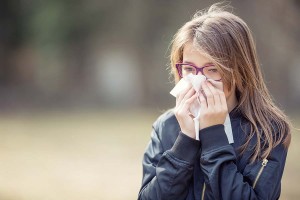By our Smarty friends at Charlotte Eye Ear Nose & Throat Associates, P.A.
August will soon turn into September, and not only are your children back at school, but they might also start dealing with fall allergies. What causes them and how should you have your children treated?
Charlotte’s pollen
Fall allergy season is generally from mid-August to mid- to late September. Late August and early September are peak pollen time. The most common causes of allergies are ragweed and pigweed, although grass counts are still high from the summer.
Allergies in southeast America are strong this time of year. The mild climate means the area has a long grass season – March to September – and mold stays for most of the year because the region does not have hard freezes.
Signs and symptoms
Allergy symptoms include nasal obstruction, clear nasal drainage, sniffles, and a sneeze. These symptoms are similar to those of colds, but colds should last only 7-10 days before improving. Allergy symptoms, on the other hand, are constant. Allergies also don’t include fevers, sore throats, and a cough, while colds do.
Get them tested and treated
If you think your child might have allergies, help is conveniently nearby at one of 17 CEENTA offices in North and South Carolina offering allergy services. There your child can get tested for reactions to any of these allergens. Our ENT doctors will then come up with a treatment plan uniquely suited to their needs, whether it’s over-the-counter medicine, prescription medications, or even immunotherapy.
Request an appointment online
If you want to request an appointment to have your child tested for allergies, you can do so through our online patient portal, myCEENTAchart. myCEENTAchart also allows you to check in to appointments online, access your patient record, pay your bill online, and communicate with your care team. To sign up for myCEENTAchart, visit www.myceentachart.com.
![]()
Charlotte Eye Ear Nose & Throat Associates



